 Hartlepool Sports & Leisure
Hartlepool Sports & Leisure
- Cinemas, Theatres & Dance Halls
- Musicians & Bands
- At the Seaside
- Parks & Gardens
- Caravans & Camping
- Sport
 Hartlepool Transport
Hartlepool Transport
- Airfields & Aircraft
- Railways
- Buses & Commercial Vehicles
- Cars & Motorbikes
- The Ferry
- Horse drawn vehicles
 A Potted History Of Hartlepool
A Potted History Of Hartlepool
- Unidentified images
- Sources of information
- Archaeology & Ancient History
- Local Government
- Printed Notices & Papers
- Aerial Photographs
- Events, Visitors & VIPs
 Hartlepool Trade & Industry
Hartlepool Trade & Industry
- Trade Fairs
- Local businesses
- Iron & Steel
- Shops & Shopping
- Fishing industry
- Farming & Rural Landscape
- Pubs, Clubs & Hotels
 Hartlepool Health & Education
Hartlepool Health & Education
- Schools & Colleges
- Hospitals & Workhouses
- Public Health & Utilities
- Ambulance Service
- Police Services
- Fire Services
 Hartlepool People
Hartlepool People
 Hartlepool Places
Hartlepool Places
 Hartlepool at War
Hartlepool at War
 Hartlepool Ships & Shipping
Hartlepool Ships & Shipping

Hartlepool Shipwrecks
Details about Hartlepool Shipwrecks
Images and documents relating to shipwrecks and strandings that have occurred at, or off, the ports of Hartlepool and West Hartlepool.
Location
Related items :
 Ann Louisa - Hartlepool - 1883
Ann Louisa - Hartlepool - 1883
Hartlepool Northern Dail Mail, Wednesday, February 7th, 1883:
WRECK AT HARTLEPOOL. A SEAMAN DROWNED. EXCITING SCENE. In a strong gale blowing from the S.S.E this morning, about five o’clock, the schooner Ann Louisa, of Rye, owned by Mr. Judson, of Seaham Harbour, drove on to the rocks below the new pier at Hartlepool and immediately became total wreck. From the statement the master, Captain Booth, it appears that Ann Louisa left Seaham on Sunday last bound for Southampton with a cargo of coal. She proceeded all well as far as Flamborough Head, bearing up through strong gales and heavy seas, and arrived north of the Hartlepool head soon after four o'clock this morning. Here she became unmanageable in the heavy sea, and not answering her helm drove on to the rocks.
The rocket apparatus, under command of chief boatman Temple, of the coastguard, was soon brought into position, and aided by a number of willing hands, who, hearing the distressful cries of the crew rushed to the spot, five rockets were fired. All five went over the vessel, but owing to the exhausted state of the crew it was some time before any of the lines were made fast. The masts now snapped and fell, and the vessel began to part when one of the men dropped from the cage into the water, a coastguardsman and a civilian, however, whose names we have yet been unable to ascertain, were lowered into the sea, and succeeded in rescuing him.
All hands were brought in safety to shore, with the exception of one, Wm. Sharp, aged 18, who is supposed to have been washed over-board. He was last seen under lee of the galley, and immediately afterwards disappeared.
When landed the wants the crew were administered to by Mr. Richard Robinson, lifeboat coxswain, who lives at No. 6, Catherine Street. The schooner is now utterly demolished, her bottom being store in, and she must shortly go to pieces.
 Baltic - Hartlepool - 1898
Baltic - Hartlepool - 1898
Hartlepool Northern Dail Mail, Monday, March 28th, 1898:
THE GREAT STORM WRECKS AT WEST HARTLEPOOL. BRAVE EFFORTS OF LIFEBOATMEN. Rocket Brigades at Work. EXCITING RESCUES OF THE CREWS. Although the storm which has been raging on the North - East Coast since Tuesday slightly abated yesterday, it still continued with considerable force. The sea was not running so heavy as on the two preceding days, but still it was very rough.
In the afternoon a schooner was observed in difficulties off West Hartlepool, and after vainly trying to make the harbour for some time she was driven ashore just under the high wall which runs parallel with the N.E.R. goods sidings behind the Old Town. The vessel took the ground about 150 yards from the shore just at five o'clock. It was then seen that she was the Baltic, hailing from Drammen, a Norwegian port. The cause of the stranding was that the vessel got too far to leeward. A tug boat went to her assistance before this and had got two lines on to the boat, and was in the act of getting the hawser on board when the chain of the steering gear broke, and the tug boat had consequently to leave her.
The Stranton lifeboat Foresters' Pride was at once launched, but could make no headway against the wind and sea, and after several attempts had to put back again. The Hartlepool lifeboat was also out. In the meantime the Stranton rocket machine, which was in charge of Mr. D. Collins, was got to work from the high wall opposite the ship, but after the first shot part of the apparatus fell over into the sea.
It was essential that this should be recovered before the work could be proceeded with, and Mr. Jones, a young engineer, residing at 15, Ward Street, who happened to be present, volunteered his services, was lowered over the wall in the breeches buoy, and recovered the article, sustaining no more serious injury than a few bruises. Ultimately a line was thrown over the vessel, and fell across a rope high up in the rigging.
In the meantime thousands of people had collected, and every available site was occupied, including the railway waggons which were crowded with onlookers. As the tide rose volumes of spray broke over the wall and did the men who were working the rocket machine some service by keeping the crowd back, but nevertheless they seemed to be a good deal impeded in their work by people who in their eagerness to get a good view pushed and jostled them at every turn. In fact the behaviour of the crowd was anything but good, although this was no doubt the result of thoughtlessness.
As the line was thrown over the rigging of the ship a considerable time elapsed before the hawser could be fixed, and it was well for the crew that they were not in imminent danger. They had been battling with the storm for the past four days, and consequently were not in the best of trim tor making the most of the opportunities offered to them. The vessel too, had suffered considerably. Her stanchions had been carried away, she had lost her topsail, and she was making water long before she came ashore.
The crew consisted of seven hands, and these were all brought to land in the breeches buoy. Several of them had rather a rough passage along the rope, and were under water for a considerable part of the journey, but all were safely landed. The captain came last, and he seemed almost prostrated. They were taken in charge by Mr. Larson, assistant to the Swedish and Norwegian consul, and accommodation found for them at the Station Temperance Hotel and Mr. Watson's restaurant.
The Baltic, we may state, was bound for Boston, and had had an exceedingly rough passage.
 Braemount
Braemount
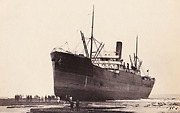 Donated by Maureen Anderson
Donated by Maureen AndersonDated 1912
The Braemount of Glasgow bound from Hull for Middlesbrough to load a part cargo went aground at Hartlepool on 14 July 1912. Her main engines were disabled & it took multiple attempts by tugs over a few days before she was re-floated.
More detail » Eskburn stranded
Eskburn stranded
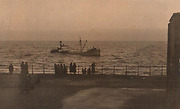 Donated by Maureen Anderson
Donated by Maureen AndersonDated 1921
The Eskburn was stranded at Hartlepool on 9th February 1921. The crew were able to clamber across the rocks to safety. The vessel was eventually re-floated and went on her way.
More detail » Flora - Hartlepool - 1883
Flora - Hartlepool - 1883
Shields Daily News, Saturday, February 3rd, 1883:
WRECK OF A SCARBOROUGH SCHOONER AT HARTLEPOOL. Hartlepool, Friday.—Early this morning strong south-south-east gale, accompanied heavy rain, squalls, broke over the district of the Hartlepools, and shortly after three o'clock a small schooner from Scarborough, the Flora, Captain Baker, whilst making for the old harbour, with a cargo of barley, from Blakeney, drove on to the rocks, outside the new breakwater, close to the Heugh. The coastguard, whose rocket apparatus is stationed at this spot, speedily fired a line to the stranded vessel, but it fell abaft the mizenmast, therefore a second rocket was fired, but with no better result, and the captain and crew of three took to the boat, in the fear that the vessel would break up. They had no time to save a single article of clothing, and narrowly escaped perishing from the capsizing of the boat, and shortly after they landed their vessel began to break up and is now a total wreck. The Flora belonged to her captain, and was uninsured. Upon being landed the wrecked men were taken charge of by Mr. Armstrong, the local agent of the Shipwrecked Mariners' Association.
Hartlepool Northern Dail Mail, Tuesday, February 6th, 1883:
WRECKING AT HARTLEPOOL. This (Tuesday) afternoon at the Hartlepool Borough Court, Catherine Hanley and Mary Melia were charged with wrongfully carrying away a jib-sail and other gear from the ketch Flora, which was wrecked on the shore on Friday morning; and Anthony Anson with carrying away a quantity of rope, and Daniel Golden a quantity of tarpaulin, the 2nd February. The vessel went ashore to the north of the lighthouse, and notwithstanding the fact that it was broad daylight, the defendants helped themselves. The magistrates taking a lenient view of the matter, fined each of the women 10s and costs, and dismissed the men with a caution.
Sunderland Daily Echo and Shipping Gazette, Friday, February 8th, 1883:
Friday, at 1 p.m. – Sale of Wreck, near the Lighthouse, Hartlepool. Mr. Graham, Auctioneer.
 Lowestoft Trawler aground
Lowestoft Trawler aground
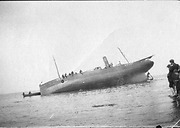 Donated by John Dee
Donated by John DeeLowestoft Trawler aground off Hartlepool.
More detail » Lowestoft Trawler aground (2)
Lowestoft Trawler aground (2)
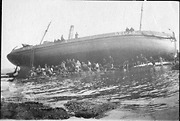 Donated by John Dee
Donated by John DeeQuite a crowd has gathered round a stranded Lowestoft steam trawler at Hartlepool.
This vessel was Mascot, LT1038, built in 1907 by John Chambers of Lowestoft for Arthur Gouldby(1869-1951) of Kessingland, Suffolf.
In 1918 the vessel was bought by Jack Breach(1887-1944) with a partner, and operated by Jack Breach Ltd in the herring fishery until 5th August 1927 when she ran aground.
Salvors were called in for a refloat, no charge fee of £200, but could not get her off. In the end efforts were called off and the salvors went away with £52 10s expences. Jack Breach had to sell her for breaking as she lay and received just £7 10s for this fine old wooden vessel which had braved many a storm.
The vessel weighed 62 tons gross and 74' 6' long.
More detail » Martha - wrecked at Hartlepool
Martha - wrecked at Hartlepool
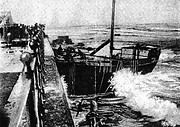 Created by unknown
Donated by Mr. Erik Hag / Tees Packet
Created by unknown
Donated by Mr. Erik Hag / Tees PacketDated 1919
A rather grainy image of the Swedish schooner Martha, which was wrecked at hartlepool on February 23rd, 1919, with the loss of two lives.
More detail » Martha - wrecked at Hartlepool 1919
Martha - wrecked at Hartlepool 1919
Northern Daily Mail, Monday, February 24th, 1919:
"WRECK AT HARTLEPOOL - Exciting Rescue Work - Two of the crew drowned.
During the fog on Saturday night the new three-masted Swedish schooner Martha, of Gothenburg, bound for Hartlepool with pit-props, ran ashore on the rocks off Hartlepool promenade, and is now a total wreck.
About seven o’clock on Saturday night the vessel was seen to be makingsignals, but owing to the dense fog prevailing these could not be understood. The schooner herself was not discernible, but by the motion of her lights it was apparent that she was then riding, although in difficulties.
The Hartlepool Lifeboat was manned and proceeded in tow of a tug to render assistance, but, owing to the heavy swell running and the broken water, it was found impossible to get near the vessel, and the Lifeboat had to return.
The Martha was driven ashore by the rising tide and the rescue work had therefore to be undertaken by means of the rocket apparatus, under the direction of the Chief Officer of the Coastguard. Communication was established from the Promenade but the operations were rendered extremely difficult owing to the inward movement of the vessel and the consequent slackening of the line. The breeches buoy had to pass through heavy breakers and the men thereby received a savage buffeting as they were being drawn ashore.
Of the crew of eight, two youths lost their lives, doubtless through being swept out of the buoy as they were being rescued – in fact, it is stated that in the case of one of them this was observed from the shore. After stranding, the vessel was swept by heavy seas and the crew suffered severely from exposure. Every attention was given to the six men rescued, who included the captain, and they were removed to Hartlepool Hospital.
The hull of the vessel – for the masts and deck fittings have now all been swept away – was this morning lying almost flush with the Promenade, the heavy seas completing the destruction."
Hartlepool Northern Daily Mail, Friday, February 28th, 1919:
"WRECK OF THE MARTHA. Any Person in possession of Props salved from the "Martha", wrecked at hartlepool, must give immediate notification of same to the Superintendent of Police, Hartlepool. Following notification, such Persons will be liable to prosecution."
 Royal Navy Motor Launches
Royal Navy Motor Launches
Two Royal Navy Motor Launches were lost off Hartlepool during the Second World War.
On October 11th, 1941, the 112ft. Fairmile "B" Motor Launch, built by the Sittingbourne Shipbuilding Co. (completed August 19th, 1941), was lost off Hartlepool through stress of weather.
HDML 1388, a 72ft. Harbour Defence Launch built by Cardnell Bros., Maylandsea (completed November 25th, 1943), grounded at Hartlepool on December 24th, 1943, and became a constructive total loss.
 Shipwrecks at Hartlepool - 1898
Shipwrecks at Hartlepool - 1898
A compilation of documentary accounts - many from local newspapers - relating to shipwrecks and strandings at Hartlepool in 1898:
Sunderland Daily Echo and Shipping Gazette, Monday, March 28th, 1898:
BRIGANTINE ASHORE AT WEST HARTLEPOOL. Just before high-water yesterday afternoon several vessels made for the harbour at Hartlepool. Three of them, with the assistance of tugs, managed to get safely in, but the Norwegian brigantine Baltic got too far to the southward, and was seen drifting under the railway wall of West Hartlepool. A tremendous sea was running, and the vessel drove within 150 yards of the wall.
The lifeboat Forester was launched from the Stranton beach, and made an attempt to get up, and in the meantime the rocket apparatus was got to work, and after one or two attempts threw a line right over the ship. At last the crew, seven in number, were safely landed. Shortly afterwards a Norwegian vessel, the Wilfred, drove ashore, and the crew of eight were landed by the rocket apparatus from Seaton Carew. The storm at West Hartlepool shows signs of abating.
HARTLEPOOL VESSEL LOST. The Beaconsfield, owned by Messrs. Danby and Son, West Hartlepool, was bound for that port from West Mersea. On Friday, on the full tide and in the gale, she drifted and became a total wreck.
More detail » Thomas - wrecked 1904
Thomas - wrecked 1904
 Created by unknown
Donated by Maureen Anderson
Created by unknown
Donated by Maureen AndersonDated 1904
Hartlepool Northern Daily Mail, Saturday, April 23rd, 1904:
NEWS FROM THE SEA. The Wreck in Hartlepool Channel. The brig Thomas, which stranded in the Hartlepool channel on Wednesday, now lies on the north side of the channel out of the way of the traffic. She has been dismasted and her spars and some of her sails have been beached. Part of her deck has been removed and the work of salving the cargo of timberhas already been commenced.
 Twelve vessels on shore - 1841
Twelve vessels on shore - 1841
Morning Post, Tuesday, November 23rd, 1841:
TWELVE VESSELS ON SHORE. Our correspondent at Hartlepool has furnished us in detail with the particulars of the situation of the vessels which have been stranded or wrecked on this coast between Hartlepool and the little watering-place at about three miles distance, Seaton Carew. It was on Saturday afternoon that the wind began to blow very strong from the E.N.E., and it continued to increase in violence all night. On Sunday morning, and during the day, a great many vessels were observed making for the Tees, some of which succeeded in getting into this port. Others, after vainly attempting to ride it out, were driven on the Seaton Sands.
Those which came ashore on the Hartlepool and Seaton Sands are twelve in number, as follows:— The Garland, of Sunderland, in ballast; the Hartford, of Weymouth, in ballast; the William, a schooner, belonging to Berwick, loaded with iron ; and the Reindeer, of Hartle- pool, in ballast ; all of which are not much worse, and may be expected to be got off without much difficulty. The Aerial, of Sunderland, and the Shannon, of Sunderland, though considerably damaged, are expected to be got off. The Albatross, Williamson, of Hartlepool, corn laden, is also seriously damaged, but will be eventually got off. The Lochiel, a little sloop from Inverness, with pit props, has become a total wreck. The Elizabeth, Newton, of Boston, coal-laden, is also entirely wrecked, as is the Aboyne, Stroud, of Rochester, also coal-laden, and the Exchange, Smith, of Lynn, in ballast.
Our correspondent includes the loss of the Susannah, of Stockton, in his list, the particulars of which we have given above. He attributes the heavy list of wrecks principally to the bad management of the Hartlepool steam-boats. The Aerial, which is copper-sheathed, is, we are informed, a very valuable vessel, just come off a West Indian voyage. She is the property of John Barry, Esq.
More detail » Umvolosi
Umvolosi
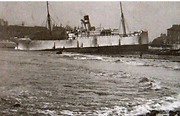 Created by Stonefield Series
Donated by Maureen Anderson
Created by Stonefield Series
Donated by Maureen AndersonDated 1907
Owned by Bullard, King & Co. of London. From Southampton for Furness, Withy's dry dock when entering Hartlepool Harbour a strong easterly wind swung her around with her bow lying within 40 feet of the Town Wall completely blocking the Harbour entrance. She was towed off on the following tide.
More detail » Wilfrid - Hartlepool - 1898
Wilfrid - Hartlepool - 1898
Hartlepool Northern Dail Mail, Monday, March 28th, 1898:
THE SECOND DISASTER. Before the crew of the Baltic had been got ashore another schooner was observed out at sea, evidently making for West Hartlepool. It was now dark, but the vessel came on in the same course as her predecessor, got too far to leeward, and stranded within a ship's length of the Baltic. She turned out to be the three-masted Norwegian schooner Wilfred, from Svelsig. The tide had now ebbed a good deal, and the crew did not appear to be in any immediate danger. The Stranton rocket machine, however, fired a shot, but the line was unfortunately lost. The Seaton Carew rocket machine, under the charge of Captain Robinson and Mr. Darch, was then brought up, and a line thrown on board. The crew did not appear very familiar with the working of the apparatus, but once it was started all the eight hands were got off without a hitch, the last of them being brought to shore about ten o'clock.
Notwithstanding the lateness of the hour the Town Wall was lined with spectators, who cheered each of the men as they arrived.
The captain stated that they had been struggling with the storm for five days, and they all appeared much exhausted. One lad in particular seemed to almost knocked up. It was reported that one of the crew had an arm broken, but this is incorrect. They too, were taken in charge by Mr. Larson, who found them lodgings in the town.
All the life-saving arrangements were in charge of Mr. Williams, chief boatman.
During the afternoon the barque Dagmar, also from Drammen, arrived in the port, and at one time it looked as if she, too, was going to get too far to leeward. However, she managed to get into the port in safety.
SMART RESCUE BY SEATON MEN. A Seaton Carew correspondent writes: The members of the Seaton Carew Rocket-Saving Apparatus Company received word after eight o'clock that a three-masted schooner had gone ashore. Captain Robinson at the first attempt placed the line over the ship amidst great cheering. The hawser was soon fastened on board the ship, and the crew of eight men were landed on the railway wall. From the time of the rocket being fired and the last man being landed only eighteen minutes elapsed.
 X.L. - Hartlepool - 1843
X.L. - Hartlepool - 1843
Carlisle Journal, March 4th, 1843:
Fatal Shipwreck Hartlepool —Feb. 24,— Yesterday morning, about half-past four o'clock, a most distressing shipwreck occurred at this port, more fatal in its results than any which has been witnessed there for some years. At the above hour the brig X.L., Captain Hinds, of London, and bound from Antwerp to Hartlepool, came ashore amongst the rocks to the north of the harbour.
The rockets were fired, and one of the lines seemed go directly over the vessel, but the crew, either from not understanding its use, or not being able to seize it, made no use of it. The vessel went speedily to pieces, and the crew, consisting of nine persons, and also the captain's wife (with the exception of a boy named Kyffin, who reached the beach on a plank,} all perished. One poor fellow, clinging to a part of the wreck, seemed almost within the grasp of several persons, but when they hoped to seize him, a wave swept him away into deep water, where he was drowned.
This sad misfortune is supposed to have arisen from the master of the vessel mistaking light on the South Terrace for the pier light. The survivor expected soon to recover.
Hartlepool Northern Daily Mail – Saturday 31st July 1880:
The Wreck of the Brig X.L. (A Hartlepool Pilot’s Story)
The following graphic story which has been narrated to us by Mr James Pounder, pilot of Hartlepool will, we are sure, prove interesting to a large section of our readers. The heart-rending circumstances attending the wreck of the brig X.L. of Hull, on the Hartlepool Heugh had a large bearing on the movement for the present erection of the present lighthouse, with the construction of which we shall deal next week.
‘It was, I believe on the 23rd of February 1843 that a sight was witnessed in Hartlepool which I shall not forget to my dying day. Hartlepool was a wild sort of place then. The sea did pretty much as it liked with us, and we pilots had roughish work at times. Many a night while waiting for daylight on board some ship that I had taken in hand to pilot, I have fancied I heard above the howling of the wind the fearsome splash of the billows on the Heugh, and I have thought what a dreadful thing it would be to be struggling among all that surging waste, living all my life over every second and battling in the darkness for dear life. Well I recollect that about 10 o’clock that February night, while I was just walking out a bit on the Foreland, sort of idle like, conning over in my mind some of the rough nights I have seen, and I have seen a good many. I looked out seaward and I couldn’t help my heart giving a big thump as I saw a ship hugging the land there nor’ard of the Moor.
The wind whistled coldly and it was just such a night as would make a man prize a snug hearthstone and a bit of warm supper. I shouted out without thinking what I was doing, but I might just as well have saved my wind. The sound of my voice was beaten back, and I felt how helpless I was against the mighty elements. The sea was running very strong. Land folks don’t know what they mean when they say mountains high. I should say the waves were like mad things leaping and howling in their rage. I knew there was danger and I felt for the men who had naught between them and death, but a straining plank or two. The danger had been seen by some more of our townsfolk and together we shouted from the cliff and urged the Captain to ride out to sea southwards to save his life and the lives of his crew. But he, poor man, not knowing the terrors of our coast as well as we did had preferred to cast his anchor and face out the storm, apparently rashly believing that he could get some shelter from the headland.
We made out that the brig was the X.L. of London that it was coming light from Antwerp and was commanded by Captain Newry. There was a crew of nine hands all told and the captain’s wife. We knew what would happen and we couldn’t go to bed. So we stood and shivered and tried, through the darkness, to give some consolation to those poor souls on board that ill-fated ship. And there we were powerless to help, for a boat wouldn’t have lived a minute on such a sea. And through that long night, in the pauses of the wind, we thought we could hear the calm voices of those men as they spoke in their seamanlike work. Ah! We longed for the light, though we feared the gruesome story it might tell.
Well, it’s no use making too long a story. The morning came grey and dull and cold, and the sea looked as I’ve seen a bull-dog look between its snarls. When it was light enough we could see that the ship was unmanageable, and that the death agony was not far off. Ah those poor things they were brave Englishmen, and they fought hard for their lives; but with no unruly striving. There were no rockets to be had in Hartlepool, and somebody set off post-haste to Seaton for some. They could only get six, and the first missed while the rest went right over. There was naught for it but to try to haul a warp on board, and with some great difficulty we did that at last.
But the poor things didn’t seem to know what to do. We made the rope fast and with all our might we held on. Well, some of them tried to travel, and were fastened to the warp with small ropes. But it was a fearful journey and one by one they dropped into the boiling surf. We could see the captain, brave man I am sure he was, and kind husband; wrap his oilskin cape tenderly around his wife, as though he wished to keep the water off her. That touched many a heart, and among the crowd of men and women that had then gathered there went up many a sob, and many a man who had faced a watery death himself, as he saw that captain forgetful of himself and kind to that poor woman, bid God bless him.
It seems strange that we should see all this and render no help. But we couldn't. It was no lack of will. It was sheer want of power; the creature was powerless against the wrath of the Creator. Then with a crash the ship beat and smashed against the beach, and as a wave receded we saw that they were all struggling in the water. We cast out life-buoys, but they didn’t seem to mind them. One poor thing, all battered and bleeding, was borne inshore by a huge wave, and was rescued. But he died a month afterwards. Ail the rest were drowned, and their bodies were washed on shore at Middleton.
I don’t care to think about the homes that were bereaved of husbands and fathers. I know that for many a day there was a heart-ache at Hartlepool, and people began talk and to say that it was time something was done to warn poor seamen of their danger. I think that had something to with the building of the lighthouse, which now warns poor mariners where to steer, and to keep off our shores, which at times are not over hospitable. Seamen don’t learn their trade as well now they used to do, but they haven’t to face such dangers they once had.’
The following verses were written at the time by Mr Edward Lowden, who himself saw the wreck. Mr Lowden at that time resided at Middleton:
"Behold from Antwerp swiftly sailed vessel called the X. L. Her sails are filled, she mounts the seas, And wafts away before the breeze.
All hearts on board were filled with glee, in hope once more their homes to seeAnd hail with deep-affected joy The friends that wept and said good-bye.
But prospect, like the rose’s bloom, And like the roses are cut down; Or, like the shooting star on high, they swiftly fly and swiftly die.
It was a dark and gloomy night when first the X. L. hove in sight, Off broken water nea r her bow. Which sore dismayed her hopeful crew.
All hands on deck!—the awful sound! The X. L. making fast aground;The boisterous waves around her spread, And every heart was filled with dread.
The showery clouds poured down their rain, the big waves rolled across the main, The stormy winds screamed in the blocks, The vessel dashed the fatal rocks.
But, oh, the shrill, the bitter cry. Of men just at the point to die; While hundreds flocked around to see The deepest scene of tragedy.
All eyes aboard were dimm’d with tears; their hearts were swelled with griefs and fears their aching bosoms heaved the sighs of men in Nature’s last surprise.
They eager looked and long’d to see the lifeboat, but it could not be. The lifeboat! was their only cry O, send the lifeboat or we die.
O, who can look upon the strife Of Nature's dying gasp for life; Or hear the deathly bitter cry O, send the lifeboat or we die.
Or who the awful sight abide, to see them banging on the side. While raging billows seemed to scoff, unloosed their grasp, and dashed them off.
There, see them struggling the main until they reached the wreck again, which furious waves repeat the woe There, off again, and down they go.
There is but one saved out of ten, while one dear woman and eight men has sunk beneath the tempest’s roar. The voyage of life to sail no more.
So mariners hear, attend the call, The voice is unto one and all. which calls in deed and word— Prepare, prepare to meet thy Lord.
Go not again across the seas, nor spread the canvas to the breeze, until you answer to the call And live for him who died for all.
Who holds the waters in his hand, the winds obey his vast command; He walks upon the stormy seas, To still the waves and hush the breeze.
And, landsmen, be ye ready, too, The warning voice comes home to you! To meet your God then all prepare, For death is stirring everywhere.
The land and sea alike to Him The wintry blast or pleasant spring, are seasons when he calls away, Prepared or not, you must obey.
So be ye reconciled to God, For you he shed his precious blood: He's standing waiting, longs to save, The sinner that will turn and live."




